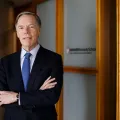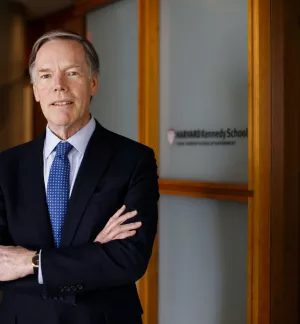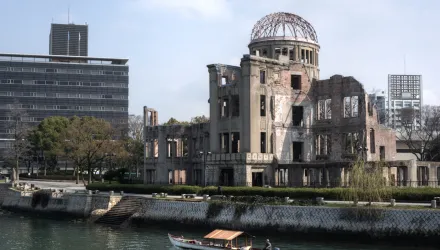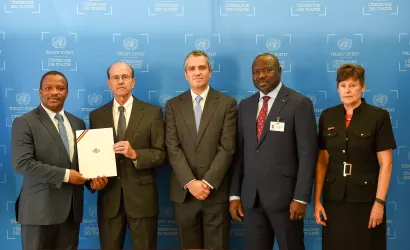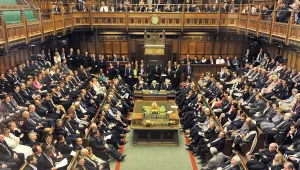Overview
Nicholas Burns recounts one of the most important events in American history—the beginning of the end of the Cold War, 20 years ago this week—and pays tribute to President George H.W. Bush's notable foreign policy achievements during his presidency. As the Republican primaries begin, Burns encourages voters to look critically at the foreign policy credibility of their candidates and who is best prepared to lead us through the thickets of the most complex foreign policy landscape we have ever encountered.
TWENTY YEARS ago this week, three courageous Soviet republic presidents, led by Russia’s Boris Yeltsin, met near Minsk to plot the destruction of their country. Less than three weeks later, on Christmas Day 1991, their decision forced the end of a once great and powerful empire that splintered into 15 new states as the communist hammer and sickle was lowered from the Kremlin. Early that morning, as a young National Security Council aide, I listened in as a notetaker from my home phone in Virginia as President George H.W. Bush made a farewell call to Soviet President Mikhail Gorbachev.
It was a stunning event — one of the most important in American history. The most powerful foe we had ever faced had collapsed and gone out of business forever. Our 50-year struggle with the Evil Empire was over and with it the threat of nuclear annihilation that had hovered over us, as President Kennedy said so memorably, like the “sword of Damocles.’’
The Cold War really ended that day, capping the extraordinary years of 1989 to 1991, when all the communist satellite states of the Warsaw Pact fell, Germany was united miraculously in NATO, and Russians, Ukrainians, Kazakhs, Armenians, and other nationalities were finally and mercifully liberated from the cruel legacies of Joseph Stalin and Leonid Brezhnev.
The true victors of the Cold War were visionaries like Vaclav Havel, Lech Walesa, and Yeltsin as well as the peoples of Eastern Europe. But, a large share of the credit is also due to George H.W. Bush who has, for too long, been denied the accolades paid to his predecessor, Ronald Reagan.
Bush’s persistent, clever, and patient diplomacy made the difference in the critical autumn of 1991. Following the attempted coup against Gorbachev in August, Bush pushed the Soviet leader behind the scenes in September to recognize the independence of the Baltic states - Estonia, Latvia, and Lithuania - which had been unjustly incorporated into the USSR at the start of World War II. In a series of phone calls and letters, Bush then artfully juggled American relations with a declining Gorbachev and rising Yeltsin. He prodded both to work out their differences peacefully and to commit to a democratic future. Bush’s cool judgment and deep reservoir of diplomatic skill and experience helped to reassure both leaders of American support as they dismantled an empire and communism without a shot being fired.
Bush’s accomplishments in ending the Cold War, unifying Germany, amassing the Gulf War coalition that defeated Saddam Hussein in that same year, and in then pivoting to start Israeli-Palestinian negotiations at Madrid make him arguably the most successful foreign policy president of the last 50 years.
What lessons can we draw from Bush’s masterful work in ending the Cold War on our terms?
First, that creative and purposeful presidential diplomacy exercised at key moments continues to be a vital national requirement. We lost sight of that at times in the decade after 9/11 when we turned too frequently to the military to respond to fires burning overseas. Second, that we need a president with a deep and unerring knowledge of the world and the self-confidence to act boldly on the biggest stage imaginable.
As we look to November, we cannot afford to elect a president who requires on-the-job training. With a rising China, nuclear challenges from Iran and North Korea, the Arab revolutions, a European financial crisis, and climate change all on the agenda, our nation’s chief diplomat must possess a clear and steady strategic compass. While the election should clearly focus on the economy, it must also be about who best can lead us through the thickets of the most complex strategic landscape we have ever encountered.
That is why Republican voters will need to judge which candidate can match President Obama’s impressive international record. This just may be a rare election when the Democratic candidate can claim legitimately that he is best prepared to defend the country, given Obama’s string of foreign policy accomplishments.
Jon Huntsman is the only candidate in the Republican field who has extensive international experience. Mitt Romney and Newt Gingrich have demonstrated adequate global knowledge. But none of the three can match the extraordinary and sophisticated international background and skill that George H.W. Bush brought to the White House at a key moment in our history. That is a worthy topic for Republicans to debate and to worry about as the primaries begin.
Nicholas Burns is a professor of the practice of diplomacy and international politics at Harvard’s Kennedy School of Government. His column appears regularly in the Globe.
Burns, Nicholas. “Our Best Foreign Policy President.” The Boston Globe, December 9, 2011

